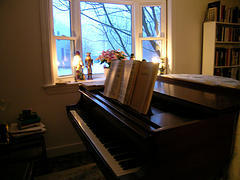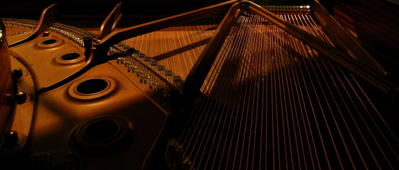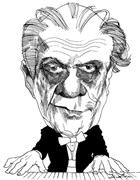
It's changed.
It had been a darker affair. A single rectangle with a weakening sill and peeling paint. Brittle blinds with broken ropes.
(It seemed just as well ... only a cruel suburban crossroad to see. A house or two and a flagpole with its proudly clanging chain.)
There was, though, something
right about
it.
Its dimensions I think.
Maybe its darkness.
Its angle on the shrubbery below?
It did ignite a memory of me-as-child and my window back then, with its same proximity to the piano.
It's changed now.
Someone new has bought the house, and I keep renting the walls for the sake of the ceilings. And suddenly, here it is! A dramatic bay window. And there, too, is the
sky!Old men now walk at length. I can learn their gaits. I once followed the shuffle of an ancient man for the entire first page of the G Major French Suite ...
Now children in this sun-soaked frame have complete choreographies to unleash.
Bicycles float past ... I have light on my face and my hands.
I can see the seasons.
There is a tree, and I'm learning its branches.
Chickadees halt and stare in at my anguishing.
And I wonder.
Does this change the practicing?
Deeply in love with the random dances that waltz into this dramatic frame, I wonder ...
Does this
change the practicing?For me, who never imagines changing the space myself,
I admire the thinkers who envision these big panes of glass.
I wouldn't have thought of this.
I wouldn't have guessed it would cause this warmth.
But whether the French Suite is better ...
Perhaps.Because this bigger view keeps urging me to consider these unexpected dances, and allows me just enough time to absorb them.
The old man's arrival in the window frame ...
Strangely slow. Meticulous.
A purposeful trip across the glass. An elderly propulsion.
Never a change in tempo, but constantly new in his nearness to trees
and puddles of darkness and sunlight.
An occasional turn of the head.
Cruel suburban shuffle.
It's a lesson for a Sarabande.


